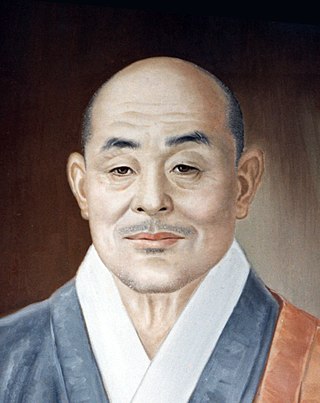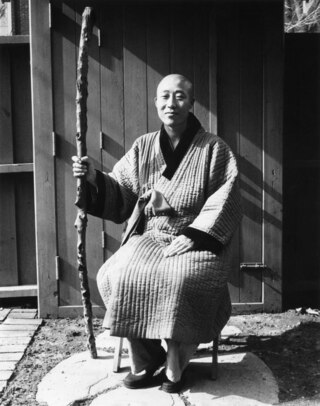
Stephen Batchelor is a Scottish Buddhist author and teacher, known for his writings on Buddhist subjects and his leadership of meditation retreats worldwide. He is a noted proponent of agnostic or secular Buddhism.

Seungsahn Haengwon, born Duk-In Lee, was a Korean Seon master of the Jogye Order and founder of the international Kwan Um School of Zen. He was the seventy-eighth Patriarch in his lineage. As one of the early Korean Zen masters to settle in the United States, he opened many temples and practice groups across the globe. He was known for his charismatic style and direct presentation of Zen, which was well tailored for the Western audience.

The term American Buddhism can be used to describe all Buddhist groups within the United States, including Asian-American Buddhists born into the faith, who comprise the largest percentage of Buddhists in the country.

The Kwan Um School of Zen (관음선종회,觀音禪宗會) (KUSZ) is an international school of zen centers and groups founded in 1983 by Zen Master Seung Sahn. The school's international head temple is located at the Providence Zen Center in Cumberland, Rhode Island, which was founded in 1972 shortly after Seung Sahn first came to the United States. The Kwan Um style of Buddhist practice combines ritual common both to Korean Buddhism as well as Rinzai school of Zen, and their morning and evening services include elements of Huayan and Pure Land Buddhism. While the Kwan Um Zen School comes under the banner of the Jogye Order of Korean Seon, the school has been adapted by Seung Sahn to the needs of Westerners. According to James Ishmael Ford, the Kwan Um School of Zen is the largest Zen school in the Western world.

Ten Bulls or Ten Ox Herding Pictures is a series of short poems and accompanying drawings used in the Zen tradition to describe the stages of a practitioner's progress toward awakening, and their subsequent return to society to enact wisdom and compassion.
Hyunoong Sunim is a Korean Zen master as well as a Taoist Master born in South Korea. He is a disciple of Ku San Sunim and entered Songgwangsa Buddhist Monastery in 1966. From 1966 to 1969 he studied in the Sutra Hall of Songgwangsa, studying Buddhist sutras and philosophy. In 1970 he began his studies of Zen philosophy and Zen meditation. After ten years of training in Zen Meditation halls, he felt that the traditional zen hall training was not helping his practice. He then lived for three years as a wandering beggar, begging for his food and places to sleep. This gave him the opportunity to let go of everything he was holding on to. It was during this period that he finally realized what correct zen practice really is, and felt that he was ready to study under a great master. He then went to Master Jeon Gang Sunim in YongHwaSa Temple in Incheon, South Korea and began studying under him.

Zen Master Wu Bong Sunim, born Jacob Perl, was a Zen master and monk in the Kwan Um School of Zen. Wu Bong Sunim was the head teacher of the European Kwan Um School of Zen until his death in April 2013.

Kobongsoensanim, the 77th Patriarch in his teaching lineage, was a Korean Zen master.
Zen master is a somewhat vague English term that arose in the first half of the 20th century, sometimes used to refer to an individual who teaches Zen Buddhist meditation and practices, usually implying longtime study and subsequent authorization to teach and transmit the tradition themselves.

The Venerable Samu Sunim, born Sam-Woo Kim, was a Korean Seon sunim previously of the Jogye Order. He claimed to have received Dharma transmission from Zen Master Weolha Sunim in 1983. He taught primarily in Canada and the United States, having opened centers in Toronto, New York City, Ann Arbor, Michigan and Chicago, Illinois as well as Mexico City.
Below is a timeline of important events regarding Zen Buddhism in the United States. Dates with "?" are approximate.

The Golden Wind Zen Order (GWZO) is an American Zen Buddhist Order with centers and groups in Long Beach, CA and Seattle, WA. It was founded in 2004 by Zen Master Ji Bong. Moore began training with the Korean Zen Master Seung Sahn in 1974, and was one of the founders of the New Haven Zen Center and core teachers of the early years of the international Kwan Um School of Zen. He was a teacher at several centers around the United States, and after more than twenty years of training, he received Dharma transmission from Seung Sahn in 1997.
The roots of Buddhism in Lithuania can be traced to the 20th century, although the time of its first introduction there remains unknown. Zen Buddhism practiced in Lithuania today originated in Korea. There are a few active communities across the country including Vilnius, Kaunas, Klaipėda, Šiauliai, Panevėžys and Šakiai.
Soshimsa Zen Center is a U.S. Buddhist organization in New Jersey, affiliated with the Taego Order of Korean Seon.
Zen was introduced in the United States at the end of the 19th century by Japanese teachers who went to America to serve groups of Japanese immigrants and become acquainted with the American culture. After World War II, interest from non-Asian Americans grew rapidly. This resulted in the commencement of an indigenous American Zen tradition which also influences the larger western (Zen) world.

Seon or Sŏn Buddhism is the Korean name for Chan Buddhism, a branch of Mahāyāna Buddhism commonly known in English as Zen Buddhism. Seon is the Sino-Korean pronunciation of Chan an abbreviation of 禪那 (chánnà), which is a Chinese transliteration of the Sanskrit word of dhyāna ("meditation"). Seon Buddhism, represented chiefly by the Jogye and Taego orders, is the most common type of Buddhism found in Korea.
Zen Master Daewon Moon Jae-hyeon is a Korean Zen master in South Korea. A disciple of Zen Master Jeongang, he received Dharma transmission from his teacher and thereby becoming the 78th patriarch in the Dharma Lineage of the Buddha in 1962.

Daehaeng Kun Sunim was a Korean Buddhist nun and Seon (禪) master. She taught monks as well as nuns, and helped to increase the participation of young people in Korean Buddhism. She made laypeople a particular focus of her efforts, and broke out of traditional models of spiritual practice, teaching so that anyone could practice, regardless of monastic status or gender. She was also a major force for the advancement of Bhikkunis (nuns), heavily supporting traditional nuns’ colleges as well as the modern Bhikkuni Council of Korea. The temple she founded, Hanmaum Seon Center, grew to have 15 branches in Korea, with another 10 branches in other countries.

Hanam Jungwon was a Korean Buddhist monk and Seon master. He was also the spiritual head(宗正) of what was to become the modern Jogye Order of Korean Buddhism. He was the Dharma disciple of Gyeongheo Seongu, and the Dharma brother of Woelmyeon Mangong.
Venerable Chi Kwang Sunim is a Zen Buddhist nun. She is currently the leader of a small community and forest retreat in Kinglake, Victoria.
3. Pohwa Sunim quoted from Zen Dharma Exchange #1 “Dualistic Thinking”
4. Pohwa Sunim quoted from Zen Dharma Exchange #2 “Enlightenment”











